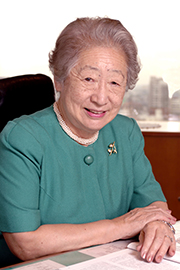
The late Ogata Sadako
On April 1, 2020, the Japan International Cooperation Agency Research Institute changed its name to the Japan International Cooperation Agency Ogata Sadako Research Institute for Peace and Development (abbreviated as the JICA Ogata Research Institute).
Dr. OGATA Sadako served as the United Nations High Commissioner for Refugees (UNHCR) for ten years, after which she led JICA as President from October 2003 until March 2012. In October 2003, JICA underwent a change in legal status, from being a special corporation to becoming an independent administrative corporation. Dr. OGATA emphasized a field-oriented approach in which projects were carried out on the basis of the needs of local people and local context, and she focused her efforts on promoting human security.
On October 1, 2008, under the leadership of then-President OGATA, a new JICA was established through the merger of the former JICA, which was mainly responsible for technical cooperation related to Japan’s development assistance, and the Overseas Economic Cooperation Operations of the former Japan Bank for International Cooperation (JBIC), which was responsible for loan assistance. With this merger, the new JICA became an organization capable of developing and implementing impactful projects that were better suited to meeting local needs, by combining the three instruments of loan assistance, grant assistance, and technical cooperation.
The revision of the Act of the Incorporated Administrative Agency - Japan International Cooperation Agency positioned research activities into its primary business, integrating the research functions¹ of each organization (the former JICA and former JBIC) into the new JICA. President OGATA spearheaded the establishment of the JICA Research Institute in October 2008 with the aims of conducting policy-oriented studies on challenges faced by developing countries in the field and strengthening Japan’s intellectual presence in the international community.
Dr. OGATA passed away on October 22, 2019 at the age of 92, but we are keeping her legacy alive. On April 1, 2020, we are reborn with a new name in order to carry on and develop the purpose for which she established the JICA Research Institute. We also seek to further enhance the intellectual contributions that the institute makes for the purposes of world peace and development.
The JICA Ogata Research Institute endeavors to further enrich its research and dissemination activities by synthesizing and sharing the Japanese experience of development and development cooperation as a donor country, and by addressing the challenges and threats that we face today. Such challenges include changes to the international order, the transition to an information-based society, and climate change. By conducting high-quality research from a field-oriented perspective and disseminating research findings with strong policy impacts, the institute aims to serve as a world-leading research hub for development and international cooperation.
FN 1. Previously, the research activities of the former JICA were conducted by the Institute for International Cooperation (IFIC), which was established in 1983 as an in-house thinktank to provide knowledge and expertise directly linked to JICA operations. IFIC undertook case study analyses of technical cooperation, country and thematic assistance strategies, and analyses of assistance methods. Meanwhile, the research activities of the former JBIC were carried out by the JBIC Institute (JBICI), which succeeded the Research Institute for Development Assistance (established in 1993) of the ex-Overseas Economic Cooperation Fund, building on its earlier research units (Research and Development Department (1974- ) and the Economics Department (1988- )). JBICI conducted studies and research on economic cooperation, development assistance theory, and development challenges faced by developing countries. Also, it was actively engaged in joint research with international organizations to contribute to global development trends.











scroll